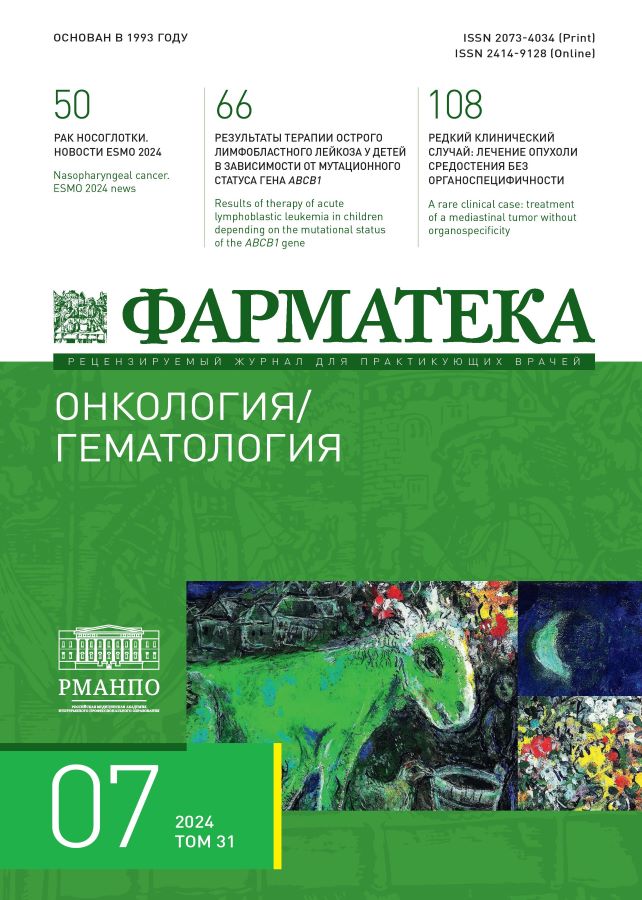A rare clinical case: treatment of a mediastinal tumor without organospecificity
- Authors: Yakimenko Y.A.1,2, Kutukov V.V.1,2, Gavrilova S.P.2, Rotar K.N.1
-
Affiliations:
- Astrakhan State Medical University
- Regional Clinical Oncology Dispensary
- Issue: Vol 31, No 7 (2024)
- Pages: 108-110
- Section: Clinical case
- URL: https://journals.eco-vector.com/2073-4034/article/view/646390
- DOI: https://doi.org/10.18565/pharmateca.2024.7.108-110
- ID: 646390
Cite item
Abstract
The incidence of malignant neoplasms is steadily increasing every year. In addition to common localizations, oncologists encounter non-standard tumors that require a personalized approach to treatment depending on the clinical situation. In recent decades, there has been significant progress in the creation of pharmacological drugs that are successfully used in the treatment of cancer, which selectively affect various targets in tumor cells. The article presents a clinical case of diagnosis and treatment of an anterior mediastinal tumor without organospecificity. An effective option for drug therapy aimed at targets found in tumor cells is described. The presented example demonstrates an individualized approach to the choice of treatment for a cancer patient and the effectiveness of its use.
Keywords
Full Text
About the authors
Yaroslavna A. Yakimenko
Astrakhan State Medical University; Regional Clinical Oncology Dispensary
Author for correspondence.
Email: maleeva.yaroslavna@yandex.ru
ORCID iD: 0000-0002-2276-2562
SPIN-code: 7642-6150
Postgraduate Student, Department of Oncology and Radiation Therapy, Astrakhan State Medical University
Russian Federation, Astrakhan; AstrakhanV. V. Kutukov
Astrakhan State Medical University; Regional Clinical Oncology Dispensary
Email: maleeva.yaroslavna@yandex.ru
ORCID iD: 0000-0002-8167-2997
Russian Federation, Astrakhan; Astrakhan
S. P. Gavrilova
Regional Clinical Oncology Dispensary
Email: maleeva.yaroslavna@yandex.ru
ORCID iD: 0009-0004-7602-1243
Russian Federation, Astrakhan
K. N. Rotar
Astrakhan State Medical University
Email: maleeva.yaroslavna@yandex.ru
ORCID iD: 0009-0000-9522-9665
Russian Federation, Astrakhan
References
- Li B., Chan H. L., Chen P. Immune checkpoint inhibitors: basics and challenges. Curr Med Chem. 2019;26(17):3009–3025. doi: 10.2174/0929867324666170804143706.
- Robert C. A decade of immune-checkpoint inhibitors in cancer therapy. Nat Commun. 2020;11(1):3801. doi: 10.1038/s41467-020-17670-y.
- Gunturi A., McDermott D. F. Nivolumab for the treatment of cancer. Expert Opin Investig Drugs. 2015;24(2):253–260. doi: 10.1517/13543784.2015.991819.
- Sundar R., Cho B. C., Brahmer J.R., Soo R. A. Nivolumab in NSCLC: latest evidence and clinical potential. Ther Adv Med Oncol. 2015;7(2):85–96. doi: 10.1177/1758834014567470.
- Darvin P., Toor S. M., Sasidharan Nair V., Elkord, E. Immune checkpoint inhibitors: recent progress and potential biomarkers. Exp Mol Med. 2018;50(12): 1–11. doi: 10.1038/s12276-018-0191-1.
- de Miguel M., Calvo E. Clinical challenges of immune checkpoint inhibitors. Cancer Cell. 2020;8(3):326–333. doi: 10.1016/j.ccell.2020.07.004.
- Shiravand Y., Khodadadi F., Kashani S.M.A., et al. Immune checkpoint inhibitors in cancer therapy. Current Oncol. 2022;29(5):3044–3060. doi: 10.3390/curroncol29050247.
Supplementary files








